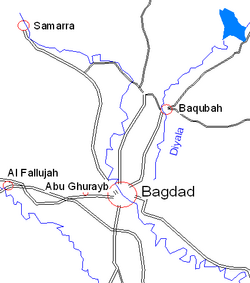Baquba
|
Baqubah بعقوبة |
|
|---|---|
| Town | |
 Map showing Baqubah north of Baghdad |
|
| Country |
|
| Province | Diyala |
| Population (2003 est) | |
| • Total | 467,900 |
Baqubah (Aramaic: ܒܰܩܽܘܒܰܐ, Arabic: بعقوبة; BGN: Ba‘qūbah; also spelled Baquba and Baqouba) is the capital of Iraq's Diyala Governorate. The city is located some 50 km (31 mi) to the northeast of Baghdad, on the Diyala River. In 2003 it had an estimated population of some 467,900 people.
Baqubah served as a way station between Baghdad and Khorasan on the medieval Silk Road. During the Abbasid Caliphate, it was known for its date and fruit orchards, irrigated by the Nahrawan Canal. Situated on the main road and rail routes between Baghdad and Iran it is a centre of trade for agricultural produce. It is now known as the centre of Iraq's commercial orange groves.
Baqubah's name originates from the Aramaic words "Bet" (house) and "Yaqub" (Jacob) and means "Jacob's house" The city was used as a refugee camp for Assyrian refugees fleeing the Assyrian Genocide. A refugee camp was set up outside the city, which accommodated between 40,000 and 50,000 refugees.
During the course of the U.S.-led occupation of Iraq, Baquba emerged as the scene of some of the heaviest guerrilla activity, along with the Sunni enclaves of Fallujah and Ramadi. It was the site of the heaviest fighting during the June 24, 2004, insurgent offensive. Al-Tawhid Wal-Jihad, led by Abu Musab al-Zarqawi, took responsibility for the attacks.
...
Wikipedia
